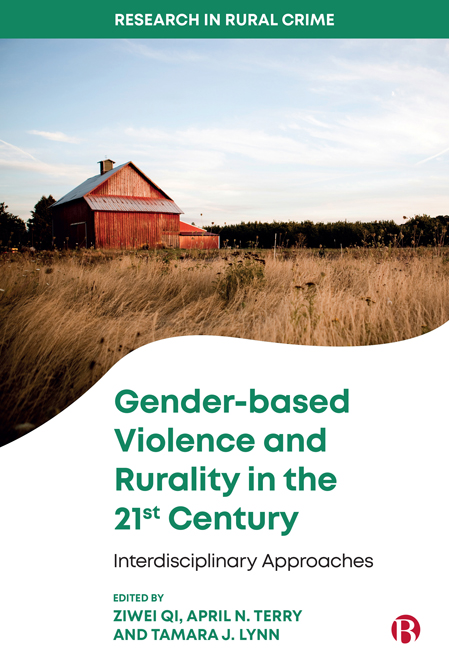Book contents
- Frontmatter
- Contents
- Series Preface
- List of Figures and Table
- List of Abbreviations
- Glossary
- Notes on Contributors
- Foreword
- 1 Understanding Rurality and Gender-based Violence
- PART I Rurality and Gender-based Violence
- PART II Beyond the Rural/Urban Divide: Critical Issues in Gender-based Violence
- PART III Access to Rural Justice: Economic Consequences and Policy Implications
- Index
11 - ‘Nowhere to Go’: Intimate Violence and Opioid Use in Rural Vermont
Published online by Cambridge University Press: 20 January 2024
- Frontmatter
- Contents
- Series Preface
- List of Figures and Table
- List of Abbreviations
- Glossary
- Notes on Contributors
- Foreword
- 1 Understanding Rurality and Gender-based Violence
- PART I Rurality and Gender-based Violence
- PART II Beyond the Rural/Urban Divide: Critical Issues in Gender-based Violence
- PART III Access to Rural Justice: Economic Consequences and Policy Implications
- Index
Summary
Introduction
The problem of intimate partner violence (IPV) in rural areas intersects with another rural crisis: the epidemic of opioid use disorder (OUD) and opioid-related deaths. Rural opioid-related mortality rates are particularly high in the New England region (Stopka et al, 2019). At the same time, feminist criminological research shows that rural women are more likely than their suburban or urban counterparts to experience violence when separating from or divorcing their spouses (DeKeseredy and Schwartz, 2009; Rennison et al, 2013). Rates of intimate partner homicide also appear to be higher in rural areas (Edwards, 2015). There is a known, bidirectional relationship between opioid use and IPV (Stone and Rothman, 2019), such that drug use may precede abuse by an intimate partner and experiencing IPV is related to subsequent drug use. Abusive partners may exercise control by introducing their partners to drugs or coercing them to use, or by interfering with a partner's treatment and recovery efforts (Warshaw et al, 2014). IPV survivors have also described how substance use in their relationships can increase violence, paranoia, jealousy and arguments over procurement or sharing of drugs (Gilbert et al, 2001).
By understanding the first-hand experiences of people accessing rural IPV and OUD services, we can identify gaps in service provision and work to close them. In 2020, this goal became even more urgent as the COVID-19 pandemic widened these gaps and highlighted limitations of social services to respond to rural communities in crisis. For example, the pandemic saw the rapid implementation and expansion of telehealth services (Demeke et al, 2020). Telehealth has the potential to expand access to care in rural communities and has demonstrated effectiveness and patient satisfaction (DelliFraine and Dansky, 2008; Kruse et al, 2017; Totten et al, 2019). However, it requires substantial investment in infrastructure (for both providers and communities), and uneven implementation may worsen rural health disparities (Hirko et al, 2020; Pierce and Stevermer, 2020).
In this chapter, we connect the results of two data collection efforts: (1) a series of in-depth interviews with rural Vermonters with lived experience of IPV and OUD regarding their experiences accessing services and resources; and (2) a series of in-depth interviews with representatives of a county-level Coordinated Community Response (CCR) team comprising professionals working in IPV-and substance use disorder (SUD)-related services.
- Type
- Chapter
- Information
- Gender-based Violence and Rurality in the Twenty-first CenturyInterdisciplinary Approaches, pp. 168 - 182Publisher: Bristol University PressPrint publication year: 2023



